Switzerland’s GDP rose by 0.2% in the 4th quarter of 2018. Manufacturing saw dynamic growth. Concurrently, exports of goods increased significantly. In contrast, domestic demand stagnated. GDP growth was 2.5% for 2018 as a whole. Switzerland’s GDP rose by 0.2% in the 4th quarter of 2018.1 As in other European countries, this confirms a slowdown of the economy compared to the first half of the year. Switzerland Gross Domestic Product (GDP) QoQ, Q4 2018(see more posts on Switzerland Gross Domestic Product, ) Source: investing.com - Click to enlarge After a weak 3rd quarter (revised GDP growth: −0.3%), the economy at least returned to a moderate growth path. Switzerland Gross Domestic Product (GDP) YoY, Q4 2018(see
Topics:
Swiss Statistics considers the following as important: 2) Swiss and European Macro, Featured, newsletter, Switzerland Gross Domestic Product, Switzerland Gross Domestic Product QoQ
This could be interesting, too:
Nachrichten Ticker - www.finanzen.ch writes Die Performance der Kryptowährungen in KW 9: Das hat sich bei Bitcoin, Ether & Co. getan
Nachrichten Ticker - www.finanzen.ch writes Wer verbirgt sich hinter der Ethereum-Technologie?
Martin Hartmann writes Eine Analyse nach den Lehren von Milton Friedman
Marc Chandler writes March 2025 Monthly
Switzerland’s GDP rose by 0.2% in the 4th quarter of 2018. Manufacturing saw dynamic growth. Concurrently, exports of goods increased significantly. In contrast, domestic demand stagnated. GDP growth was 2.5% for 2018 as a whole.
| Switzerland’s GDP rose by 0.2% in the 4th quarter of 2018.1 As in other European countries, this confirms a slowdown of the economy compared to the first half of the year. |
Switzerland Gross Domestic Product (GDP) QoQ, Q4 2018(see more posts on Switzerland Gross Domestic Product, )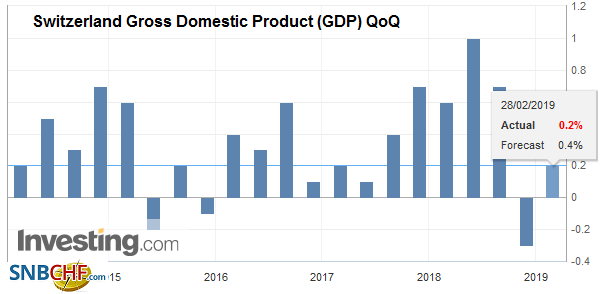 Source: investing.com - Click to enlarge |
| After a weak 3rd quarter (revised GDP growth: −0.3%), the economy at least returned to a moderate growth path. |
Switzerland Gross Domestic Product (GDP) YoY, Q4 2018(see more posts on Switzerland Gross Domestic Product, )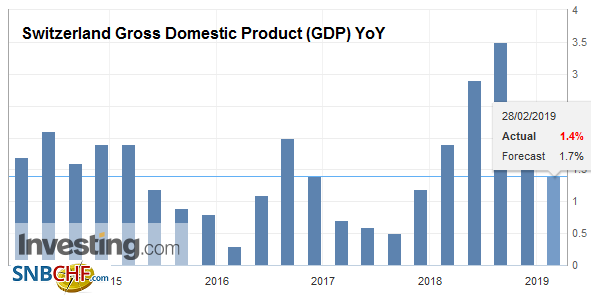 Source: investing.com - Click to enlarge |
Production SideThis was largely due to manufacturing (+1.5%). Following a breather in the 3rd quarter, the sector returned to dynamic growth, especially in the chemical and pharmaceutical segment. However, other industries also reported turnover increases, such as the watchmaking and precision instrument industry as well as the food industry. Manufacturing benefited from the strong international demand for Swiss products: exports of goods2 (+5.6%) grew substantially. |
GDP YoY Growth, Q4 2018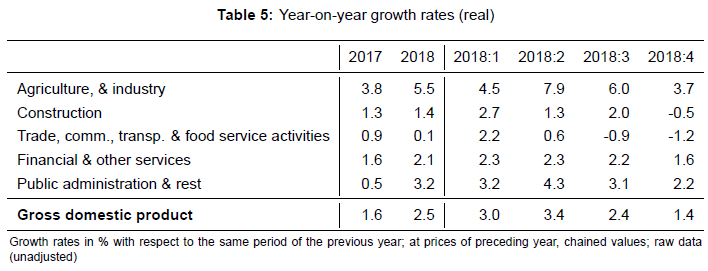 Source: bfs.admin.ch - Click to enlarge |
GDP GrowthDevelopment in the service industry varied in the 4th quarter. In healthcare (+0.9%) and in business-related services (+0,4%) value added grew once again. Meanwhile trade (−0.6%) recorded its third negative quarterly figure in a row: the slight recovery seen by retail trade could not compensate for the drop in wholesale. The negative development of the previous quarter also continued in the financial sector (−0.8%). Overall, the development of the service sector remained below the historical average, curbed by declining exports of services (−2.6 %) and a final domestic demand which remains sluggish (−0.0%). |
Quarter on Quarter Growth Rates ESVG, Q4 2018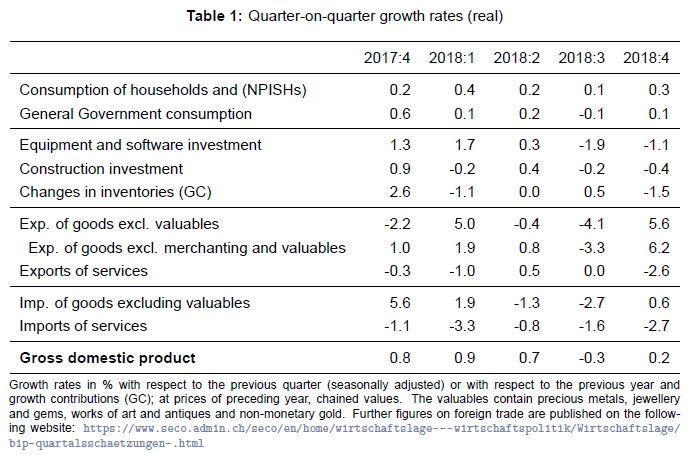 Source: bfs.admin.ch - Click to enlarge |
ExportsAfter a very weak previous quarter, the consumption expenditures of private households (+0.3%) saw a moderate rise, mainly due to health spending. Investment in construction (−0.4%), however, dipped slightly, particularly as a result of decreasing activity in building construction. Investment in equipment (−1.1%) recorded a considerably sharper decline. This can largely be traced back to the volatile research and development category, although investment activity was subdued in the other areas too. Reflecting the weak domestic demand, imports of goods and services (−0.5%) fell slightly. |
Year on Year Growth Rates ESVG, Q4 2018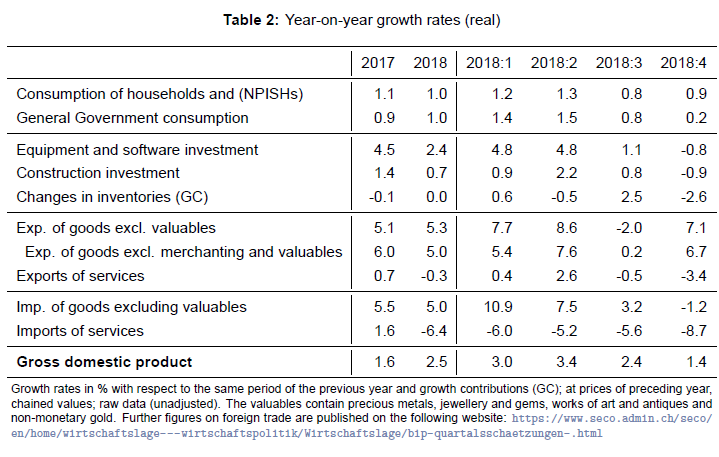 Source: bfs.admin.ch - Click to enlarge |
Initial provisional results for 2018
The provisional real GDP growth rate for 2018 is 2.5%. With this result, the Swiss economy has achieved growth comparable to that of 2014 (2.4%) for the first time again. Growth in the first half of 2018, in particular, was significantly above average. In the second half of the year, the economy weakened noticeably both in Switzerland and abroad.
Over 2018 as a whole, manufacturing was the strongest driver of growth. The sector was able to benefit from high international demand for Swiss industrial goods. Most of the other industries were also able to expand. A major exception is trade, which registered a decline in value added for the first time since 2011.
On the expenditure side, foreign trade provided the greatest impetus for growth. By contrast, domestic demand developed less dynamically. Private consumption, in particular, saw belowaverage growth, having been curbed by the weak development of real purchasing power. Investment in construction and equipment also lost momentum compared to 2017.
Tags: Featured,newsletter,Switzerland Gross Domestic Product,Switzerland Gross Domestic Product QoQ
